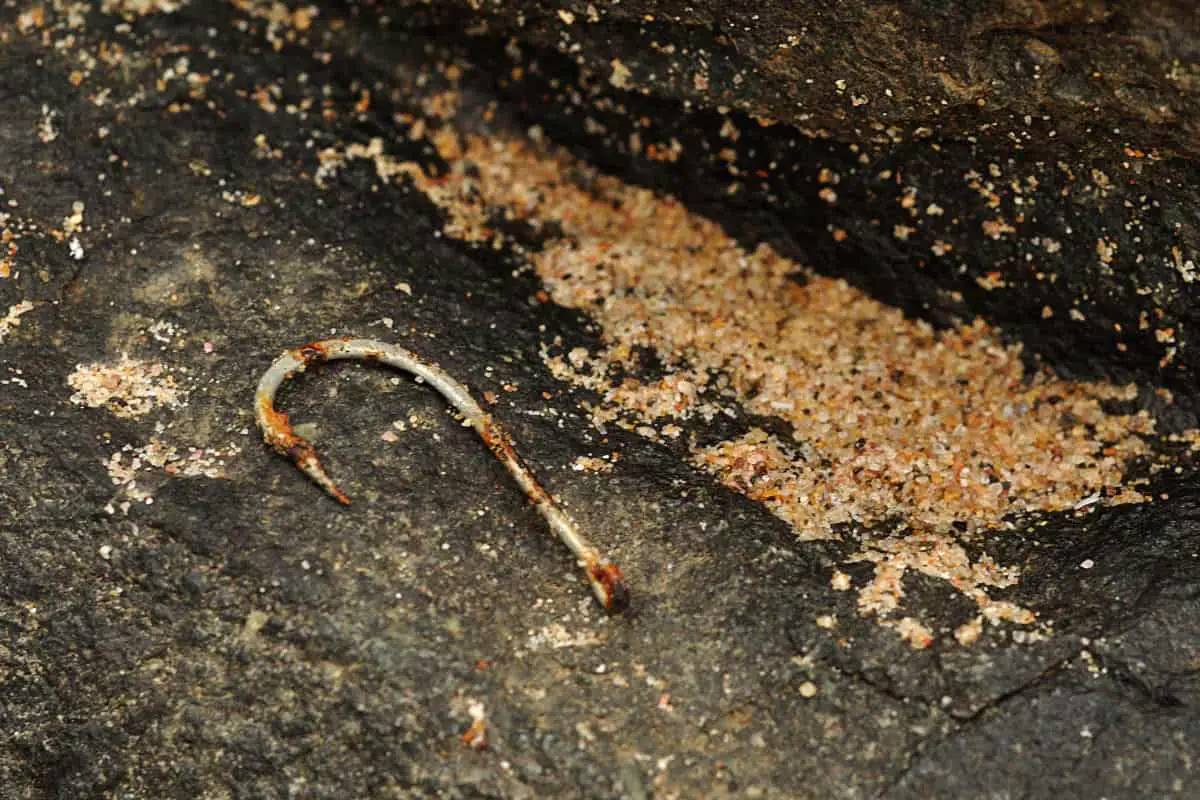As someone who enjoys fishing, you might be wondering if fish hooks dissolve. The answer is simple yet complex. When addressing the question, there are several factors that should be taken into account. So, do fishing hooks dissolve? Let’s find out!
The straight answer is yes. Fishing hooks do dissolve and mix with water after a certain time. This can change the dissolving time from a few months to a couple of years. The accurate period is difficult to know as there are factors like material, age, environment, and others in play. So, you should try to prevent this as much as possible.
In this article, I will dive deeper into the factors I’ve mentioned. As a fellow surf angler, you should be aware of the consequences of leaving hooks in the water. Moreover, I’ll discuss how you can prevent such pollution. Thus, if you have the time, stick around till the end!
How Does Fish Hooks Dissolve?
So, be sure to read this part carefully! As mentioned earlier, certain factors play a role here. These are the materials, usage, external factors, and hook size.
Material of the Hooks
Materials contribute a lot when it comes to the dissolving of hooks. They (hooks) can have different materials and coatings on them. This, in turn, determines how long it will take for the hook to dissolve. There’s a universal fact, though. Wire hooks will dissolve faster than stainless steel hooks because no extra coating is given on wire hooks.
On the other hand, stainless steel hooks are coated with gold, nickel, tin, and Teflon. Sometimes lacquer is used, which is cheaper. So, the build and coating take longer to dissolve in the water. And wire is also naturally weaker than steel. Hence, a wire hook can take a month or two, whereas steel can take a few months or years.
Usage of the Hooks
With age comes wisdom. For a hook, it is desolation. If you use a particular hook many times, it will dissolve faster. The universal factor I’ve mentioned before might reverse due to this. For example, say that you’ve been using a steel hook for a few years now. Then you bring a fresh wire hook from the market to test the dissolve time.
Considering other factors constant, you might see the steel hook dissolving first. Hence, wear and tear is a huge factor in how fast the hook dissolves. Hooks can corrode naturally while being submerged in water for too long. It can also corrode where you keep it. So, be extra cautious about where you’re keeping your hooks.
External Environmental Forces
Hooks tend to dissolve faster in saltwater than in freshwater. The main component of hooks is metal. So, the excess salt breaks down the metallic properties of the hooks easily. The current speed of the water body is also essential. If it’s a speedy river current, the hook will dissolve more quicker.
Natural habitats can create nitrogen, minerals, and oxygen compounds with their ecosystems. The natural chemicals in the water also contribute to the dissolving of hooks. If it’s a calm lake or pond, the dissolution time will be slower.
Fish themselves can dissolve hooks sometimes. This can further oxidize the metals of the hooks and dissolve them. Also, friction between moving debris in a river or pond can decrease the dissolving time.
Some fish species have tough stomachs and can ingest inedible objects. So, if a fish gets hooked and runs away, there are two chances. One, it ate the hook. Two, it rammed against other debris or rocks to detach the hook. So, you see, numerous things are happening underwater that gradually dissolve the hook.
Size of the Hooks
When it comes to dissolving, size matters. The bigger the hooks are, the slower they dissolve! If you lose a big stainless steel hook, it will take longer to break down. If it’s a small wire hook, you guessed it! So, you cannot overlook the size.
There are some special hooks on the market. These are made for catching large fish. Hence, they are barbed with extra steel and coatings. These types of hooks take the longest time to disintegrate. So, look out for these hooks! They can severely hamper the aquatic environment!
Hence, these are the prime factors that help dissolve the hooks. But is that a good thing? To let all these hooks dissolve this way? Aren’t they harmful? What type of impact can you expect? So, keep reading if you want the answers to these questions!
The Impacts Of Dissolved Fish Hooks
We’ve learned how hooks dissolve in water without going into scientific details. Now, let’s talk about the consequences of dissolving fish hooks. You might be wondering what a dissolved hook can do to the environment. Sadly, no one can do anything on their own in this world.
Hooks can be as harmful as throwing away bottles, cans, and plastic. Hence, it degrades the biochemical properties of water. Fish and other aquatic plants require certain pH levels to survive. But that can be hindered by dissolving unnecessary metal hooks. This in turn damages the natural ecosystem inside the rivers or ponds.
Sometimes the fish are unable to detach the hook from their mouth. In that case, they run around with that hook in their habitat. If that hook has corrosion, the fish becomes an infection carrier. And if that fish dies, this infection may spread all over its home. As a result, this can have both short- and long-term consequences.
Long-term consequences could include a lack of fish and unexpected price increases. Hence, think twice before you throw away or misuse your hooks. And what can you do to get out of this predicament? If you want to save your planet and yourself, keep on reading!
Can Fishing in the Rain Affect the Dissolving of Fish Hooks?
Surf fishing rain conditions can definitely impact the dissolving of fish hooks. Rainwater contains acid, which can cause hooks to corrode faster. It’s important to use high-quality corrosion-resistant hooks and inspect them regularly when fishing in the rain to avoid losing your catch.
How To Prevent Dissolving Hooks?
Now you are aware of the adverse effects of dissolving hooks. To protect nature, you must make changes in how you use them. So, here are some simple things you can do to avoid disintegrating hooks.
- Buy hooks that are strong, long-lasting, and corrosion-free. Make sure they have the coatings I’ve mentioned before, like tin, gold, or Teflon. You can also get some great deals online and choose the best one.
- Avoid throwing away the hooks. If it is safe, then untangle reels and get your hooks ashore. If you’re in it for the sport, then unhinge your hook before releasing the fish. Also, avoid wire hooks at all costs. And buy decent sizes so the hooks don’t get lost.
- You can also avoid using hooks at all! There are other methods of catching fish. Sharp traps or naturally crafted hooks are also pretty good! Additionally, you can spearfish while scuba diving. You can use nets as well!
So, there are great alternatives to hooks out there! Just be cautious and buy the best ones. Remember, change always starts with you! In the end, it’s all up to you.
Conclusion
So, do fish hooks dissolve? Now you know the answer. In short, fish hooks dissolve, and material, usage, and environmental factors play a role. Ecosystem disruption, the deaths of countless fish, and economic loss are among the few impacts.
To avoid this, invest in high-quality hooks, quit misusing them, or prevent them altogether. I hope I was able to provide you with some insight into today’s topic. Thank you for reading all the way to the end!

